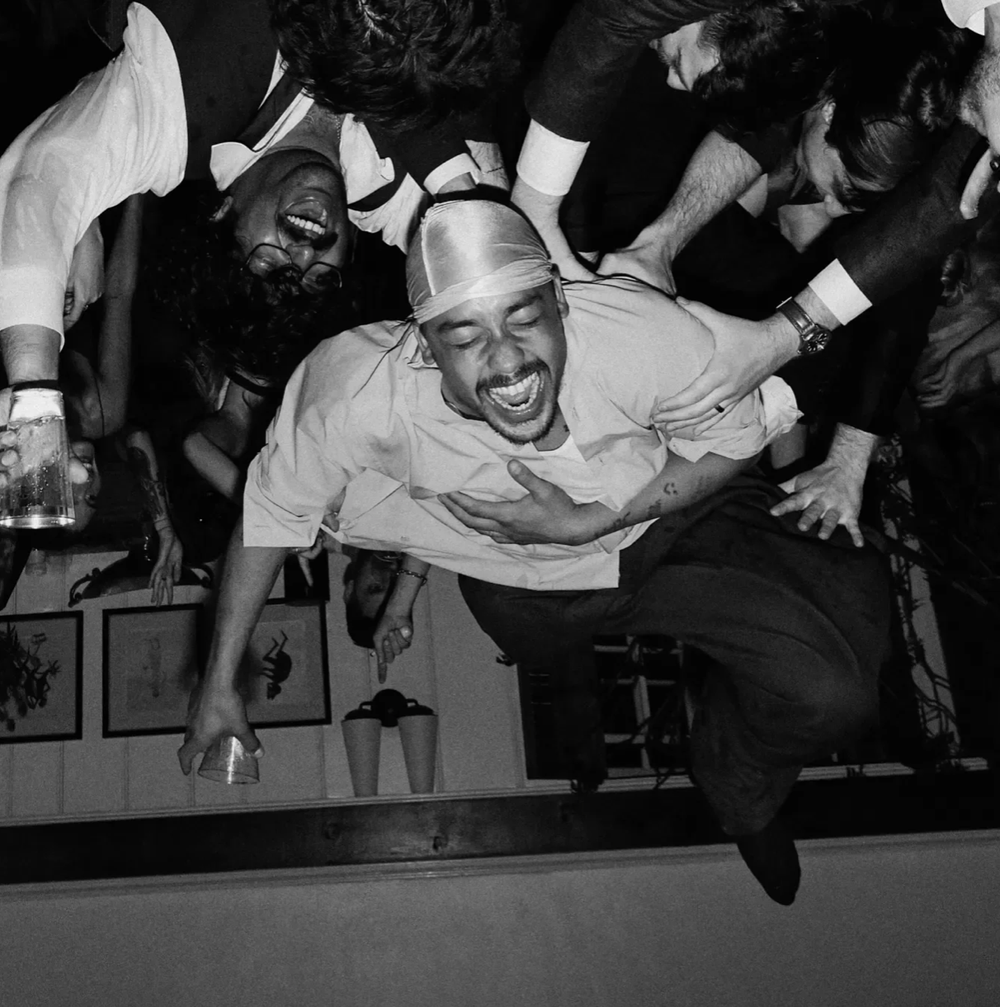Dijon’s debut record, Absolutely, is raw, messy, and a taste of something revolutionary. In the four years since then, he’s worked with Bon Iver and most recently with Justin Bieber on his latest album, SWAG. Together with his longtime collaborator and friend, Mk.gee, Dijon Duenas is pioneering an entirely new vision for R&B. The jagged edges remain in his sophomore album, Baby, but there’s also newfound clarity, which speaks to his personal evolution into husband and father.
As previously seen in Absolutely’s companion film, Dijon has a gift for producing immersive listening experiences. His music is alive and so physical you’ll get swept in it enough to think you might be able to touch it with your hands. It demands you to be present, otherwise the designed disorder will lose all sense. If Baby is a house, each song sounds like it’s coming from a different room. “Baby!” provokes the gentle image of Dijon singing a lullaby to his firstborn. From first dates and late nights to an intense delivery room, it’s a song made through lived memory. It’s the emotional cornerstone, the point where everything else flows from, a love song to his family.
When you give love freely, and deeply, it will boomerang back to you, and the closing track “Kindalove” comes back to the first song’s sentiments. Listeners will find Dijon in a warm room with the lights dimmed. He’s comforted by the “sweet kind of love / That honey / That make me complete kind of love,” that “super elite kind of love.” Somehow multiple songs in one, it’s simultaneously illogical and peaceful, resembling what love often feels like.
It’s within these bookends that desire and devotion blend into Dijon’s mosaic. “‘Cause baby we got all we need to expand the collection,” he sings in “Another Baby!”. Playing off the title track, Dijon implies he and his wife, Joanie, have everything they need to make another member of their family. “Automatic” features a sample from GZA and ODB of Wu-Tang Clan freestyling on Video Music Box and reiterates just how truly effortless this connection he has is.
“Yamaha” could have been a lead single with all its glitter. Layered vocals give the impression of a small choir and support his urgency and sincerity – “Baby I’m in love with this particular emotion / Can you see me in this particular emotion?” – forward and onward. “HIGHER!” is a jubilant, glitchy declaration of gratitude. Vignettes of getting up to tend to the baby when his wife is tired and relishing in the simple act of getting his necktie tied by her emphasize the joy he feels getting to do life with someone. As the rhythm trips over itself at times, so Dijon skips with pride and awe.
This positivity counters some of his past work, and in “FIRE!” Dijon bluntly addresses this shift when he says, “Even if I kill myself right now / Well, the last laugh’s all on me.” IDM blooms into gospel acapella, and the darkness that once held him captive collapses in the face of love. He’s steadier now, rooted in the reality of choices made and left behind. But love as an anchor through another person can only take you so far. Purposefully lowercase “my man” and “loyal & marie” are companion pieces of quiet complexity. In a cold, nightswept room, the former explores dependency and disappointment, and the latter pushes and pulls on what it means to be close. It’s so easy, this relationship, and that’s why Dijon doubts himself as a partner.
The drum hits in “(Freak It)” shatter glass and leave behind the hi-hats heard in “(Referee)”. These parenthetical interludes are dizzying and possess little finesse, but they’re essential to the infrastructure of the record. Dijon isn’t someone who does anything by half; nothing is tangential, even if it’s only a minute-long space. He uses every second to continue expressing this big and transformative love.
“Rewind” strips down to a guitar and vulnerable self-interrogation. Dijon sheds light on the worry he carries as a new dad. “Will his love lack light? / Like mine? / Will his brains beg him / “Be kind,”” he wonders, contemplating legacy. The only response to these rhetorical questions are burdened sighs and “that’s a lot.” It’s heavy, but it’s still proof of the love that has motivated the whole record.
The 37 minutes go by incredibly fast, painting a portrait of domesticity that is anything but mundane. There’s nothing predictable, no familiar shape to the music, and instead of frustrating, it strengthens. With each electronic mood swing, Dijon samples himself on top of grooves and riffs that give you little choice but to move with it. There are hooks with enough power to linger in your mind despite the layers and layers that might surround it. The chaotic fragmentation of lyrics, synths, and reverb are placed with the precision of a master.
To listen to Baby is to embrace the inelegance and dissonance of life. Most of the album leans into the abstract, and it’s constantly moving along a spectrum of love. Rather than avoid what sounds “wrong,” Dijon pursues it and ends up with songs that sound incredibly right. He welcomes the notion of error, making the sonic ecstasy sweeter. Love requires action and creation, and he understands this intimately. Honest and triumphant, Baby is a testament to the power of love and a solidification of Dijon’s path towards becoming a legend.
